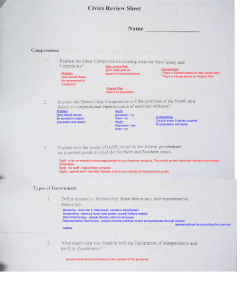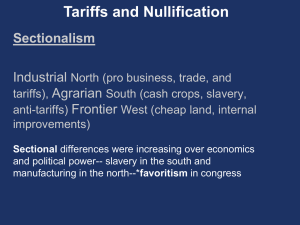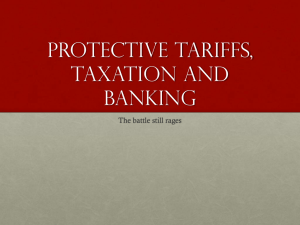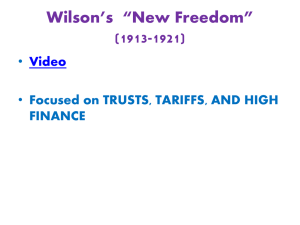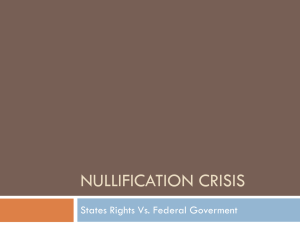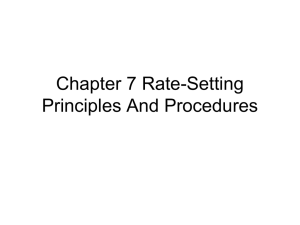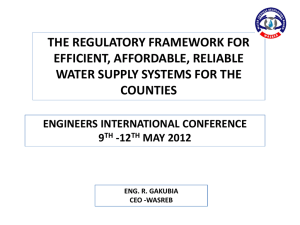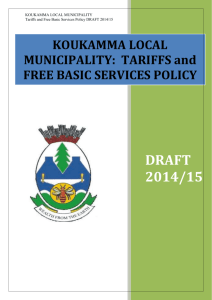Cash Management
advertisement
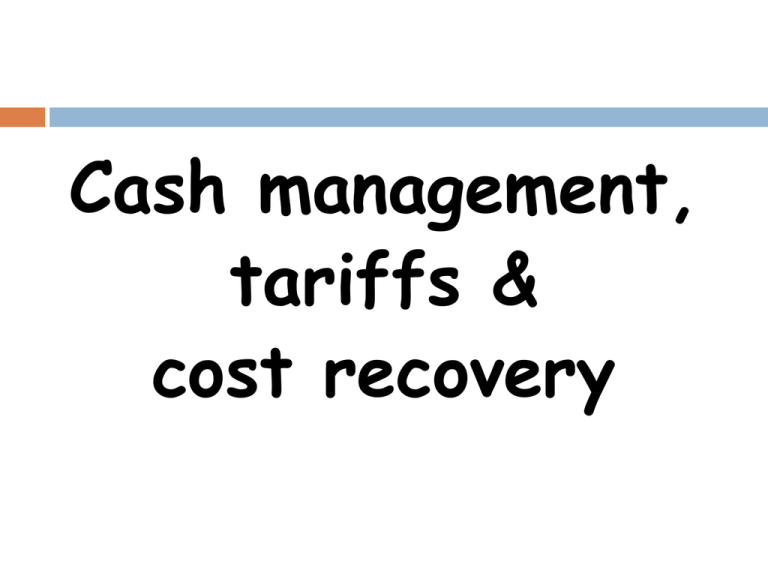
Cash management, tariffs & cost recovery CASH MANGEMENT IMPORTANCE of TARIFFS TARIFF PRINCIPLES COST RECOVERY CONCLUSIONS What is the most important operational activity of a municipal CFO? To ensure sufficient cash available to sustain operating activities 2010/2011 – 66 municipalities under financial distress 30 June 2012 - Aggregate municipal consumer debt - R77.6 billion 30 June 2011 – Aggregate municipal consumer debt - R64,6 billion Growth since 30 June 2012 – more than 20% A breakdown of consumer debt as at 30 June 2012 is: Government R3,2 billion (4.1%) Households R50,8 billion (65,4%) Other (business, industry) R23,6 billion (30,5%) Total R77,6 billion Government is buffered against the practical survival challenges experienced by households and industry Consumer debt - factors Affordability for example, unemployment and pensioners; Resistance to pay as a result of claimed poor service delivery for example incorrect consumer accounts or still clinging to the pre-94 payment boycotts; and Ineffective collection for example a failing disciplinary system to address non-payment on a fair basis and political interference. AGSA audit opinions for all municipalities, 2006/07 to 2010/11 300 4 4 3 4 32 250 46 40 7 13 120 115 1 54 91 113 Number of Municipalities 200 73 150 Audits outstanding Unqualified - without findings 63 Unqualified - with findings Qualified 50 Disclaimer Adverse 100 104 110 50 53 53 55 103 50 19 0 2006/07 11 10 7 7 2007/08 2008/09 2009/10 2010/11 What is the most important annual activity in a municipality? The approval of a balanced budget What is the most important objective of a municipality? Service delivery Do ratepayers have a right to complain? Yes! Why? Because of the budget agreement. BUDGET AGREEMENT Between the community and the municipality: Municipality promise: Provide goods and services at an agreed quality and quantity Community commitment: Pay the agreed rates and tariffs. The setting of rates and tariffs – seldom major arguments Defaulting to budget agreement – results in major arguments The setting of rates and tariffs – seldom at the core of major arguments Defaulting to budget agreement – results in major arguments Tariffs – basic principles Goods and services have value Free market trading - a value (tariff) is attached to goods and services that benefit both parties Municipality - only supplier of municipal goods and services - not free market Consumers does not have a strong bargaining edge rely on the integrity of their political representatives for fair tariffs. Viable trading - elements The quality and quantity of the good or service must be as promised by the supplier; Full cost recovery – effective tariffs & payment on due dates. Legislative framework Section 74(1) of the Municipal Systems Act (Act 32 of 2000): The municipal manager must implement the tariff policy adopted by the council on the levying of fees for municipal services provided by the municipality itself or by way of service delivery agreements. TARIFF ISSUES Cognisance of: the tariffs applicable elsewhere in the economic region, and the impact of tariffs on local economic development Tariffs ≠ Taxes Uniformly & fairly applied throughout the region Tariffs should recover the cost &: should be directly related to the standard of service received and the quantity of the particular service used or consumed Annually review - indigency support programme Differentiation between categories of consumers ito the Constitution and other legislation – must be reasonable and fully disclosed in the budget Take due cognisance of the high capital cost of establishing and expanding trading services Tariff adjustments - effected from 1 July each year All minor tariffs - standardised within the municipal region & adjusted annually in line with the CPI. TARIFF PRINCIPLES The two most important qualities of a tariff Simplicity & Transparency Consumers should be able to relatively easy calculate (verify) the service charges levied CFOs should be familiar with the tariff principles and policies to properly advise their councils Principle Whenever costs are measurable, they should be recovered by way of user tariffs (user charges), and not taxes. COST RECOVERY Costs must be recovered to ensure the provisioning of the relevant goods or services is sustainable Tariffs must be realistically calculated: based on reliable quantities and the required standard of the services Measurable services – Cost recovery is achieved by charging the end-users the total cost of production plus a relevant portion of the longterm operating and maintenance costs, eg: A consumer who wanted to have electricity provided to his home would be expected to pay: the cost of connecting the house to the electricity grid; a portion of the amortized operating and maintenance cost of the bulk infrastructure required to generate and distribute electricity, and a rate on the volume of electricity used based on the marginal cost of every kilowatt hour of electricity consumed. Models used for determining cost recovery rates Measurable services: Downward-sloping marginal cost curve - economies of scale resulting in those consuming more, charged less per unit than those consuming less. The size of a marginal cost will change with volume and includes the following: variable costs dependent to volume, fixed cost independent to volume, jump fix cost increase or decrease. TOTAL COST Price Total cost Variable cost Fixed cost 0 1 2 10 Volume TOTAL COST (JUMP IN FIXED COST) Price Total cost 200 Variable cost 140 100 Fixed cost 0 Volume 1 2 8 10 12 MARGINAL COST Price 0 1 2 10 12 Progressive block tariff model make the initial levels of consumption (blocks) more affordable, or even free, while charging increasingly higher prices as the consumption levels rise. Not easily measured services A flat rate that covers the average fixed and variable cost of the service. Equity concerns can be dealt with through the application of differential rates. All cost-recovery models depend on ‘ringfencing’ CONCLUSIONS Municipalities should be given the opportunity to present realistic budgets Service delivery must be on standard (as agreed during the budgeting process) Tariffs should be simple and transparent Cost must be recovered Cash management must be disciplined No political interference.
